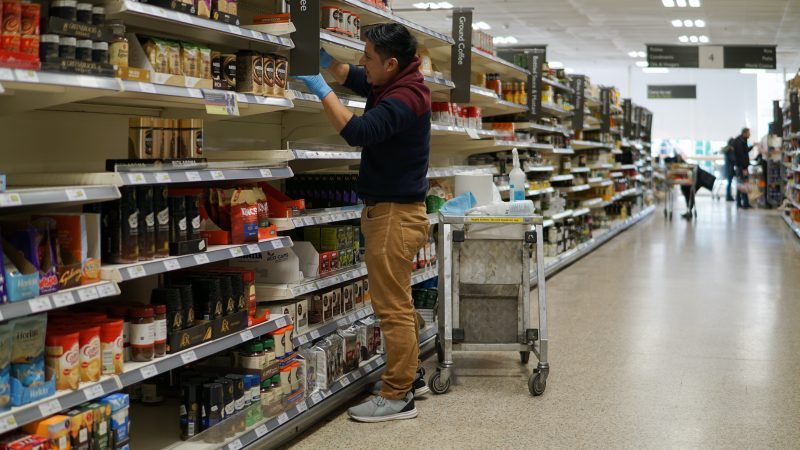
As UK retail and hospitality have been badly impacted by coronavirus, employees across the sectors face an unprecedented present and an unpredictable future. Around 1.7 million retail and hospitality workers have been furloughed since the pandemic started. And since the end of the first wave of Covid, many businesses have opened fewer branches and taken half of their employees back to work with new safety measures, with the remaining workers staying on furlough.
125,000 retail jobs have been lost this year and 14,000 shops have permanently closed. The retail sector is facing a massive crisis, and this is the time for the Labour Party and its local and national leaders to go the extra mile and play a vital role – not only to save business in the high streets, but also to protect its employees. Recent analysis by Labour found that there will be more job losses in November when the new job support scheme kicks off, as it will do little to stop the rise of unemployment, and there are gaps in the Chancellor’s most recent announcement.
The government recently rejected a call from the unions to introduce legislation to protect retail workers from abuse. This will make the retail workers day-to-day job more challenging, as they now have an additional duty to follow the new safety measures with a reduced amount of staff in the business. Some customers have not been following the government’s rules – such as wearing a mask, keeping their distance, using hand sanitiser – whether they are shopping in a super market, buying their lunch or dinner from a café or drinking pints in a pub.
We saw reports in August showing employers “overworked” hospitality staff, while customers “abused” them, while the government promoted its ‘Eat Out to Help Out’ scheme. The mandatory 10pm hospitality closing time in England has a big impact on staff when businesses are dealing with large crowds of customers with only half of their employees. The hospitality employees have to work extra hard, without flexibility, to fulfil the business needs within the reduced time. And they are earning less than before as they cannot do a full shift, contracted hours or overtime due to the 10pm curfew.
Businesses big and small across the retail and hospitality sectors have taken advantage of government schemes throughout the pandemic. They have received a good package of financial support, which costs billions of pounds. But some of these businesses are planning to send their employees home empty-handed. Many of them have already said they will have to consider making job cuts after the government’s furlough scheme ends if demand does not pick up to levels seen before Covid damaged sales. Some retail employers have said they have been encouraged by their performance since reopening, but their sales will not recover to pre-pandemic levels as long as social distancing rules are in place.
The Union of Shop, Distributive and Allied Workers (Usdaw) has urged the parliament for an urgent recovery plan to save the retail sector, from which shopworkers will undoubtedly benefit. Labour needs to work with Usdaw and push the government to introduce an industrial strategy and recovery plan to protect existing jobs and businesses; to create new employment for people out of work; and to introduce new legislation to protect the contract of workers so that employers cannot change contractual hourly wages and other employment rights, which are also part of the human rights of a shopworker. Within Labour’s proposal for a targeted, sector-based approach, the party leadership should consider prioritising the retail and hospitality sectors while also fighting for the rights of NHS staffs and care workers.
There is much Covid-related legislation that has been introduced by the government to protect the public. The Labour leadership should push the government for a new jobs campaign and to introduce Covid-19 related employment law with a possible sunset clause, if needed. The law should be introduced to protect the jobs and rights of shopworkers. Employment law has not been developed to protect retail staff from potential income and job losses, especially during the pandemic. This is the time for Labour politicians to scrutinise business, and to look at the profit they have gained in previous years. Labour must examine the future strategies of companies and offer to help protect the jobs of retail workers. The government should also look at the plans for those businesses that have been taking loans, tax reliefs and cash grants and see what they have done to protect their employees.
The new job support scheme will start from November 1st, as set out in the winter economy plan and accompanying factsheet. Labour has already warned that half of all jobs in the hospitality sector will be at risk and business owners have repeatedly claimed the scheme will not benefit them, let alone the employees. If there is anything of use in the Chancellor’s plan, it will only advance big business in much the same way the furlough scheme has benefited employers more than the ordinary employee.
If Labour does not come forward to stand shoulder to shoulder with retail and hospitality workers, they will be left behind and neglected by their millionaire bosses. Key workers across both sectors have been undervalued for too long. The public must be reminded that they have been working bravely and tirelessly, risking their lives, while serving our communities to fulfil the demands of our daily, essential needs. Labour, as a soulmate of working-class people, directly supported by the trade unions, must continue to fight for the rights of these key workers. That’s why its alternative economic plan should demand a distinct “recover jobs, retrain workers and rebuild business” for the retail and hospitality sector in particular.




More from LabourList
Almost half of Labour members oppose plans to restrict jury trials, poll finds
‘How Labour can finally fix Britain’s 5G problem’
‘The University of the Air – celebrating 60 years of Harold Wilson and Jennie Lee’s vision’